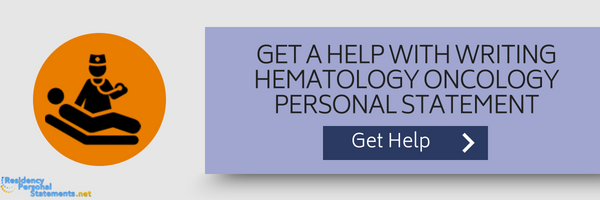
Prepare for Writing Personal Statement Hematology Oncology Carefully
The application process for a hematology oncology fellowship is highly competitive, with numerous qualified candidates and limited positions. In such a scenario, a personal statement holds immense significance, allowing applicants to stand out and showcase their unique qualities, experiences, and aspirations. A well-written hematology oncology personal statement can make a lasting impression on the admission committee and greatly enhance applicants’ chances of securing a coveted fellowship position.
By following the strategies and recommendations outlined in this article, you can effectively convey your passion, dedication, and potential, ultimately convincing officials of your suitability for a hematology oncology fellowship program.
Gather and Prepare Relevant Information
Before diving into the writing process, conducting research and preparation is essential. It helps you comprehensively explore the fellowship program, its values & objectives and relate them with your own aspirations. Such actions provide a solid foundation to craft a personal statement hematology oncology fellowship that resonates with the selection committee and highlights your perfect match with the program.
Research on the fellowship program:
Surf the program’s website, and read about the faculty, their research interests, and recent publications. Understand the program’s specific areas of focus and any unique opportunities it offers, such as mentorship programs or research collaborations. This research will help you tailor your personal statement hematology oncology to align with the fellowship program’s objectives and demonstrate your genuine interest.
Conduct introspection:
Consider the experiences, challenges, or patient encounters that have shaped your desire to pursue the hematology oncology. Reflect on your strengths, skills, and unique perspectives that make you a strong candidate for the fellowship.
Try to understand the expectations of the admission committee:
Look for any guidelines or writing prompts provided by the program. Search for previous winning hematology oncology fellowship personal statement examples. Connect with current or former fellowship members, mentors, or faculty members to gain insights into the program’s values and expectations. Understanding the committee’s preferences and priorities will allow you to customize your personal statement accordingly.
Identify Experiences, Achievements & Skills to Include in the Text
- Choose experiences that highlight your dedication to the field, such as research projects, clinical rotations, or volunteer work related to hematology oncology.
- Describe in a hematology oncology fellowship personal statement any notable achievements, such as publications, conference presentations, or awards.
- Identify the skills needed to succeed in fellowship, such as strong analytical skills, efficient communication skills, or a compassionate patient care approach.
- Connect your experiences, achievements, and skills to your long-term goals in the field, emphasizing how they have prepared you for the challenges and opportunities of a hematology oncology fellowship.
Structure a Hematology Oncology Fellowship Personal Statement Properly
The presence of a clear structure, providing a smooth narrative, may help a lot, making your personal statement easy to read. When writing your personal statement for oncology fellowship, it’s essential to highlight your dedication to patient care and your commitment to advancing the field.
Engage the Reader’s Attention From the Start
With numerous fellowship applications to review, the admission committee may have limited time to spend on each personal statement. The engaging beginning can be achieved through catchy hematology and oncology hooks for personal statement, such as sharing a poignant patient story or highlighting a significant challenge overcome. There are also several other good ideas:
- Start a fellowship personal statement with a compelling anecdote or case from your life that illustrates your passion for hematology oncology or highlights a transformative experience that shaped you as a specialist.
- Pose a thought-provoking question or present a surprising fact related to the field.
- Use descriptive tone or vivid imagery to paint a picture and draw the reader into your narrative.
- Begin a hematology oncology personal statement with a powerful thesis that resonates with your motivations and aspirations.
Ensure the Body Is Structured Well
- Identify key themes or areas of focus that align with your motivations and the hematology oncology fellowship program. While composing your heme onc fellowship personal statement, make sure to connect your personal experiences with the program’s specific offerings and values. Mention research experiences, clinical rotations, leadership roles, and community involvement.
- Decide whether to present your experiences in chronological order or group thematically, depending on what best supports your narrative and highlights your growth and dedication.
- Divide a hematology oncology fellowship personal statement into several paragraphs, one for each experience or theme. Describe here your involvement, responsibilities, and any challenges you faced.
Share Your Genuine Passion and Understanding
- Share personal stories or patient encounters that have deeply impacted your commitment to the hematology oncology.
- Highlight the skills you developed or utilized and how these experiences have shaped your commitment to the field. Connect these experiences to your potential as a fellowship candidate, emphasizing how they correlate with the program’s demands.
- Mention in a hematology oncology fellowship personal statement specific research projects, clinical experiences, or initiatives you have been involved in that highlight your understanding of the field’s complexities and advancements.
- Reflect on the ethical, social, and emotional dimensions of working in hematology oncology, showcasing your awareness of the holistic approach required in patient care.
Create an Impactful Conclusion
- Recapitulate your main motivations and aspirations, tying them back to the experiences and skills you have highlighted.
- Express your enthusiasm and desire to contribute to the field of hematology oncology and your commitment to lifelong learning and growth.
- Make the personal statement reader curious, call them to action.
Writing Style & Tone of an Oncology Fellowship Personal Statement
- Use a clear, concise, and coherent tone to convey your thoughts effectively
Use paragraphs and transition words to guide the reader smoothly from one point to another. Proofread your oncology fellowship personal statement carefully to eliminate any grammatical errors or typos that may distract the reader from your message.
- Use active voice to make your writing more engaging and direct
Active voice emphasizes the subject acting, making your statement more dynamic and compelling. Incorporate descriptive words and sensory details to create a more engaging narrative.
- Be genuine and authentic in sharing your personal experiences and reflections
Avoid exaggeration or embellishment in a hematology oncology fellowship personal statement, as it may undermine your credibility. Share your thoughts, emotions, and lessons learned from the experience, demonstrating your self-awareness and ability to reflect critically.
- Seek feedback from mentors, advisors, or colleagues
Feedback from individuals knowledgeable about the application process or with experience in hematology oncology may help improve your writing. Their insights can help refine your personal statement and ensure it effectively communicates your strengths and aspirations.
Revise Your Hematology Oncology Personal Statement Fellowship
It is recommended to go through multiple rounds of revision, editing, and proofreading of your personal statement oncologist to ensure it’s as polished and impactful as possible.
- Reread the text several times aloud to identify awkward phrasing, repetitive sentences, or unclear passages.
- Review the presence of logical transitions between paragraphs to ensure a smooth flow of ideas.
- Check the writing clearness using grammar and spell-check tools.
Taking breaks to approach it with fresh eyes and seeking feedback from trusted individuals can also help to refine your hematology oncology personal statement fellowship and polish a final version that showcases your abilities and potential to the admission committee.
FAQs About Personal Statement for Hematology Oncology Fellowship
How Long Should a Fellowship Personal Statement Be?
It should typically be around 1-2 pages or 400-700 words. However, reviewing the fellowship program’s guidelines is essential as they may have their own specified word or page limit.
How Long Does Writing a Personal Statement Take?
The time it takes to write a personal statement can vary depending on individual writing speed and the level of detail and revisions needed. Completing a well-crafted and polished hematology oncology fellowship personal statement can take several days to a few weeks. When preparing your oncology fellowship personal statement, make sure to allocate enough time for multiple drafts and thorough editing to reflect your best work.
How to Choose the Best Hematology Oncology Fellowship Program?
Consider program reputation, curriculum and training opportunities, faculty and mentorship, research opportunities, location, and career support. Conduct thorough research, visit program websites, talk to current and former fellows, and consider your personal preferences and goals to make an informed decision.
Take the Most of Expert Writing Help
Writing a compelling hematology oncology fellowship personal statement is something you can do. Following the guidance and structure in this article, you can create a fellowship application document that will convince the admission committee of your candidacy excellence and increase your admission prospects.
However, you can also benefit from professional writing services if you need extra help or want to ensure flawless application documentation. We can provide expert guidance and create a personalized personal statement for hematology oncology fellowship tailored to your unique strengths and goals. You can enjoy peace of mind by choosing us because there are only top admission experts with verified backgrounds and hundreds of successful application cases completed. They can boast not only excellent reviews but also the highest acceptance rates among customers.
So get this chance to be accepted successfully, getting a standout fellowship personal statement made for you and about you only

How to Write a Letter of Recommendation That Impresses
Good Recommendation as Essential of the Decision-Making Process A recommendation letter is one of the most vital documents you can ever prepare. It is a piece prepared by someone who can recommend your work, character, or academic performance by describing your skills, personality, abilities, motivations, and aspirations. Letters of recommendation (LoR) typically come from employers, […]
Read More
Stanford Nursing Program: 7 Facts
If you’ve considered becoming a nurse, you’re probably aware that following this noble career path now requires that you have a college education. It’s hardly surprising as it’ll be your duty to maintain and improve patients’ health in the direst of circumstances. If you want to be the best of the bests, it’s worth your […]
Read More

